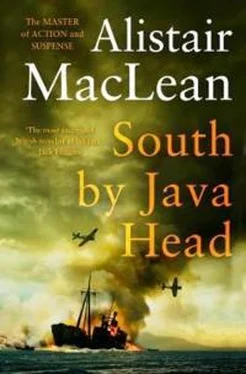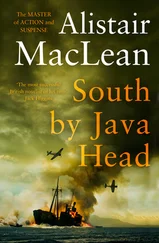It was impossible that human beings could have survived the bludgeoning, the consuming, metal-melting white heat that had reduced the Kerry Dancer to the charred, dead wreck drifting imperceptibly south-westwards towards the Abang Straits and faraway Sumatra. And, indeed, there was no life to be seen on what was left of the decks of the Kerry Dancer , no life to be seen any where, above or below. A deserted, silent skeleton, a dead hulk adrift on the China Sea… But there were twenty-three people still alive in the aftercastle of the Kerry Dancer .
Twenty-three people, but some of them had not much longer to live. These were the wounded soldiers, the stretcher cases that had been close enough to death already before the ship had pulled out from Singapore, and the concussive impact of the bombs and the gasping heat of the fires that had stopped short at the break of the after well-deck had destroyed what feeble resources and hold of life were left to most of them, and tipped the scales against recovery. There might have been hope for them, some slender hope, had they been brought out of that panting suffocation while there was yet time and lowered to the rafts and boats. But there had been no time. Within seconds of the first bomb falling, someone outside had sledge-hammered tight the eight clips that secured the only door – the water-tight door – that gave access to the upper deck.
Through this smoke-blackened door a man cried out from time to time, a cry not of pain but of anguished memory lacerating a darkening mind; there were whimpers, too, from other badly wounded men, again not moans of pain; the Eurasian nursing sister had with her all the drugs and sedatives she required, not pain but just the feeble, aimless murmur of dying men. Now and again a woman’s voice could be heard, soothing, consoling, the soft sound of it punctuated from time to time by the deep angry rumble of a man. But mostly it was just the husky undertones of sick men and, very occasionally, the quivering indrawn breaths, the lost and lonely wailing of a little child.
Twilight, the brief tropical twilight, and the sea was milky white from horizon to horizon. Not close at hand – there it was green and white, great steep-sided walls of green, broken-topped and parallel-streaked with the wind-blown spume, waves that collapsed in a boiling, seething cauldron of rushing phosphorescence and foamed whitely across the low, wide decks of the Viroma , burying hatch-covers, pipe-lines and valves, burying, at times, even the catwalks, the gangways that stretched fore-and-aft eight feet above the deck. But further away from the ship, as far as the eye could see in the darkening night, there was nothing but the eerie, glistening whiteness of wind-flattened wave-tops and driving spray.
The Viroma , her big single screw thrusting under maximum power, lurched and staggered northwards through the storm. North-west should have been her course, but the fifty-knot wind that had hit her on the starboard beam, almost without warning and with the typical typhoon impact of a tidal wave moving at express speed, had gushed her far off course to the south and west close in to Sebatiga. She was far round into the sea now, corkscrewing violently and pitching steeply, monotonously, as the big, quartering seas bore down on her starboard bow and passed over and below her. She shuddered every time her bows crashed into a trough, then quivered and strained throughout every inch of her 460 foot length when the bows lifted and fought their way clear of the press of cascading white water. The Viroma was taking punishment, severe punishment – but that was what she had been built for. Up on the starboard wing of the bridge, muffled in oilskins, crouched down behind the negligible shelter of the canvas dodger, and with his eyes screwed almost shut against the lash of the driving rain, Captain Findhorn peered out into the gathering dusk. He didn’t look worried, his chubby face was as composed, as impassive as ever, but he was worried, badly, and not about the storm. The wild staggering of the Viroma , the explosive, shuddering impact of plummeting bows burying themselves to the hawsepipes in a massive head sea, would have been a terrifying experience for any landsman: Captain Findhorn barely noticed it. A deep-laden tanker has a remarkably low centre of gravity with corresponding stability – which doesn’t make it roll any less but what matters is not the extent of the roll but whether or not a ship will recover from a roll, and a tanker always does: its system of water-tight cross bulkheads gives it enormous strength: and with the tiny access hatches securely battened down, the smooth, unbroken sweep of steel decks makes it the nearest thing afloat to a submarine. Where wind and weather are concerned, a tanker is virtually indestructible. Captain Findhorn knew that only too well, and he had sailed tankers through typhoons far worse than this, and not only across the rim, where he was now, but through the heart. Captain Findhorn was not worried about the Viroma .
Nor was he worried about himself. Captain Findhorn had nothing left to worry about – literally: he had a great deal to look back upon, but nothing to look forward to. The senior captain of the British-Arabian Tanker Company, neither the sea nor his employers had anything more to offer him than two more years of command, retirement, and a sufficient pension. He had nowhere to go when he retired: his home for the past eight years, a modest bungalow off the Bukit Timor road, just outside the town of Singapore, had been destroyed by bombs in mid-January. His twin sons, who had always maintained that anyone who went to sea for a livelihood wanted his head examined, had joined the R.A.F. at the outbreak of war, and died in their Hurricanes, one over Flanders, one over the English Channel. His wife, Ellen, had survived the second son for only a few weeks. Cardiac failure, the doctor had said, which was a neat enough medical equivalent for a broken heart. Captain Findhorn had nothing to worry about, just nothing in the world – as far as he himself was concerned.
But selfishness had no root, no hold in Captain Findhorn’s nature, and the emptiness of all that lay ahead had not robbed him of his concern for those for whom life still held much. He thought of the men under his command, men not like himself but men with parents and children, wives and sweethearts, and he wondered what moral justification, if any, he had had for risking the life of non-combatants in turning back towards the enemy. He wondered, too, about the oil beneath his feet again, about his justification, if any, for hazarding a priceless cargo so desperately needed by his country – the thought of the loss to his company he dismissed with the mental equivalent of an indifferent shrug. Lastly, and most deeply of all, he thought about his chief officer of the past three years, John Nicolson.
He did not know and he did not understand John Nicolson. Some woman might, some day, but he doubted whether any man ever would. Nicolson was a man with two personalities, neither of them in any way directly connected with his professional duties, or the manner of the performance of them, which was exceptional: next in line for command in the Anglo-Arabian fleet, Nicolson was regarded by Captain Findhorn as the finest officer he had had serve under him in his thirty-three years as master; unvaryingly competent when competence was called for, brilliant when competence was not enough, John Nicolson never made a mistake. His efficiency was almost inhuman. Inhuman, Findhorn thought, that was it, that was the other side of his character. Nicolson normally was courteous, considerate, even, humorously affable: and then some strange sea-change would come over him and he became aloof, remote, cold – and above all ruthless.
Читать дальше
Конец ознакомительного отрывка
Купить книгу










